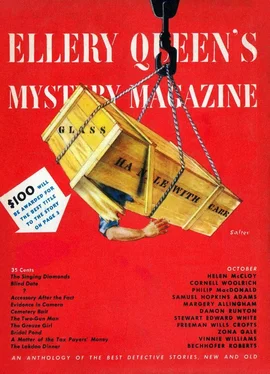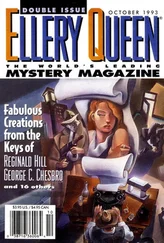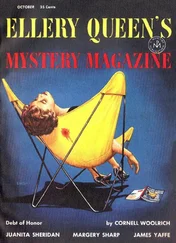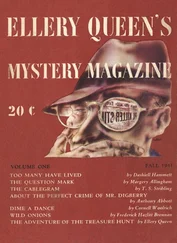Марджери Аллингем - Ellery Queen’s Mystery Magazine. Vol. 14, No. 71, October 1949
Здесь есть возможность читать онлайн «Марджери Аллингем - Ellery Queen’s Mystery Magazine. Vol. 14, No. 71, October 1949» весь текст электронной книги совершенно бесплатно (целиком полную версию без сокращений). В некоторых случаях можно слушать аудио, скачать через торрент в формате fb2 и присутствует краткое содержание. Город: New York, Год выпуска: 1949, Издательство: The American Mercury, Жанр: Классический детектив, на английском языке. Описание произведения, (предисловие) а так же отзывы посетителей доступны на портале библиотеки ЛибКат.
- Название:Ellery Queen’s Mystery Magazine. Vol. 14, No. 71, October 1949
- Автор:
- Издательство:The American Mercury
- Жанр:
- Год:1949
- Город:New York
- ISBN:нет данных
- Рейтинг книги:5 / 5. Голосов: 1
-
Избранное:Добавить в избранное
- Отзывы:
-
Ваша оценка:
- 100
- 1
- 2
- 3
- 4
- 5
Ellery Queen’s Mystery Magazine. Vol. 14, No. 71, October 1949: краткое содержание, описание и аннотация
Предлагаем к чтению аннотацию, описание, краткое содержание или предисловие (зависит от того, что написал сам автор книги «Ellery Queen’s Mystery Magazine. Vol. 14, No. 71, October 1949»). Если вы не нашли необходимую информацию о книге — напишите в комментариях, мы постараемся отыскать её.
Ellery Queen’s Mystery Magazine. Vol. 14, No. 71, October 1949 — читать онлайн бесплатно полную книгу (весь текст) целиком
Ниже представлен текст книги, разбитый по страницам. Система сохранения места последней прочитанной страницы, позволяет с удобством читать онлайн бесплатно книгу «Ellery Queen’s Mystery Magazine. Vol. 14, No. 71, October 1949», без необходимости каждый раз заново искать на чём Вы остановились. Поставьте закладку, и сможете в любой момент перейти на страницу, на которой закончили чтение.
Интервал:
Закладка:
Buck Johnson did his best, but it was like stopping with sand the innumerable little leaks of a dam. Did his riders watch toward the Chiricahuas, then a score of beef steers disappeared from Grant’s Pass forty miles away. Pursuit here meant leaving cattle unguarded there. It was useless, and the Señor soon perceived that sooner or later he must strike in offense.
For this purpose he began slowly to strengthen the forces of his riders. Men were coming in from Texas. They were good men, addicted to the grass-rope, the double cinch, and the ox-bow stirrup. Señor Johnson wanted men who could shoot, and he got them.
“Jed,” said Señor Johnson to his foreman, “the next son-of-a-gun that rustles any of our cows is sure loading himself full of trouble. We’ll hit his trail and we’ll stay with it, and we’ll reach his cattle-rustling conscience with a rope.”
So it came about that a little army crossed the drift fences and entered the border country. Two days later it came out, and mighty pleased to be able to do so. The rope had not been used.
The reason for the defeat was quite simple. The thief had run his cattle through the lava beds where the trail at once became difficult to follow. This delayed the pursuing party; they ran out of water, and, as there was among them not one man well enough acquainted with the country to know where to find more, they had to return.
“No use, Buck,” said Jed. “We’d any of us come in on a gun play, but we can’t buck the desert. We’ll have to get someone who knows the country.”
“That’s all right — but where?” queried Johnson.
“There’s Pereza,” suggested Parker. “It’s the only town down near that country.”
“Might get someone there,” agreed the Señor.
Next day he rode away in search of a guide. The third evening he was back again, much discouraged.
“The country’s no good,” he explained. “The regular inhabitants’re a set of bums and old soaks. The cowmen’re all from north and don’t know nothing more than we do. I found lots who claimed to know that country, but when I told ’em what I wanted they shied like a colt. I couldn’t hire ’em, for no money, to go down in that country. They ain’t got the nerve. I took two days to her, too, and rode out to a ranch where they said a man lived who knew all about it down there. Nary riffle. Man looked all right, but his tail went down like the rest when I told him what we wanted. Seemed plumb scairt to death. Says he lives too close to the gang. Says they’d wipe him out sure if he done it. Seemed plumb scairt .” Buck Johnson grinned. “I told him so and he got hosstyle right off. Didn’t seem no ways scairt of me. I don’t know what’s the matter with that outfit down there. They’re plumb terrorized.”
That night a bunch of steers was stolen from the very corrals of the home ranch. The home ranch was far north, near Fort Sherman itself, and so had always been considered immune from attack. Consequently these steers were very fine ones.
For the first time Buck Johnson lost his head and his dignity. He ordered the horses.
“I’m going to follow that — into Sonora,” he shouted to Jed Parker. “This thing’s got to stop!”
“You can’t make her, Buck,” objected the foreman. “You’ll get held up by the desert, and, if that don’t finish you, they’ll tangle you up in all those little mountains down there, and ambush you, and massacre you. You know it damn well.”
“I don’t give a—,” exploded Señor Johnson, “if they do. No man can slap my face and not get a run for it.”
Jed Parker communed with himself.
“Señor,” said he, at last, “it’s no good; you can’t do it. You got to have a guide. You wait three days and I’ll get you one.”
“You can’t do it,” insisted the Señor. “I tried every man in the district.”
“Will you wait three days?” repeated the foreman.
Johnson pulled loose his latigo. His first anger had cooled.
“All right,” he agreed, “and you can say for me that I’ll pay five thousand dollars in gold and give all the men and horses he needs to the man who has the nerve to get back that bunch of cattle, and bring in the man who rustled them. I’ll sure make this a test case.”
So Jed Parker set out to discover his man with nerve.
At about ten o’clock of the Fourth of July a rider topped the summit of the last swell of land, and loped his animal down into the single street of Pereza. The buildings on either side were flat-roofed and coated with plaster. Over the sidewalks extended wooden awnings, beneath which opened very wide doors into the coolness of saloons. Each of these places ran a bar, and also games of roulette, faro, craps, and stud poker. Even this early in the morning every game was patronized.
The day was already hot with the dry, breathless, but exhilarating, heat of the desert. A throng of men idling at the edge of the sidewalks, jostling up and down their center, or eddying into the places of amusement, acknowledged t he power of summer by loosening their collars, carrying their coats on their arms. They were as yet busily engaged in recognizing acquaintances. Later they would drink freely and gamble, and perhaps fight. Toward all but those whom they recognized they preserved an attitude of potential suspicion, for here were gathered the “bad men” of the border countries. A certain jealousy or touchy egotism lest the other man be considered quicker on the trigger, bolder, more aggressive than himself, kept each strung to tension. An occasional shot attracted little notice. Men in the cow-countries shoot as casually as we strike matches, and some subtle instinct told them that the reports were harmless.
As the rider entered the one street, however, a more definite cause of excitement drew the loose population toward the center of the road. Immediately their mass blotted out what had interested them. Curiosity attracted the saunterers, then in turn the frequenters of the bars and gambling games. In a very few moments the barkeepers, gamblers, and lookout men, held aloof only by the necessities of their calling, alone of all the population of Pereza were not included in the newly-formed ring.
The stranger pushed his horse resolutely to the outer edge of the crowd where, from his point of vantage, he could easily overlook their heads. He was a quiet-appearing young fellow, rather neatly dressed in the border costume, rode a “center fire,” or single-cinch, saddle, and wore no chaps. He was what is known as a “two-gun man”: that is to say, he wore a heavy Colt’s revolver on either hip. The fact that the lower ends of his holsters were tied down, in order to facilitate the easy withdrawal of the revolvers, seemed to indicate that he expected to use them. He had, furthermore, a quiet gray eye, with the glint of steel that bore out the inference of the tied holsters.
The newcomer dropped his reins on his pony’s neck, eased himself to an attitude of attention, and looked down gravely on what was taking place.
He saw over the heads of the bystanders a tall, muscular, wild-eyed man, hatless, his hair rumpled into staring confusion, his right sleeve rolled to his shoulder, a wicked-looking nine-inch knife in his hand, and a red bandana handkerchief hanging by one corner from his teeth.
“What’s biting the locoed stranger?” the young man inquired of his neighbor.
The other frowned at him darkly.
“Dare’s anyone to take the other end of that handkerchief in his teeth, and fight it out without letting go.”
“Nice joyful proposition,” commented the young man.
He settled himself to closer attention. The wild-eyed man was talking rapidly. What he said cannot be printed here. Mainly it was derogatory of the southern countries. Shortly it became boastful of the northern and then of the man who uttered it. He swaggered up and down, becoming always the more insolent as his challenge remained untaken.
Читать дальшеИнтервал:
Закладка:
Похожие книги на «Ellery Queen’s Mystery Magazine. Vol. 14, No. 71, October 1949»
Представляем Вашему вниманию похожие книги на «Ellery Queen’s Mystery Magazine. Vol. 14, No. 71, October 1949» списком для выбора. Мы отобрали схожую по названию и смыслу литературу в надежде предоставить читателям больше вариантов отыскать новые, интересные, ещё непрочитанные произведения.
Обсуждение, отзывы о книге «Ellery Queen’s Mystery Magazine. Vol. 14, No. 71, October 1949» и просто собственные мнения читателей. Оставьте ваши комментарии, напишите, что Вы думаете о произведении, его смысле или главных героях. Укажите что конкретно понравилось, а что нет, и почему Вы так считаете.












